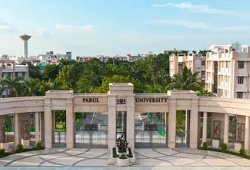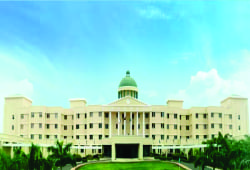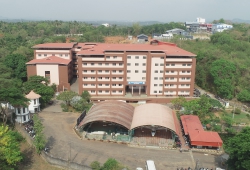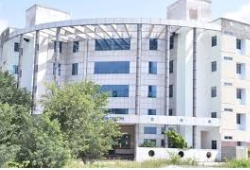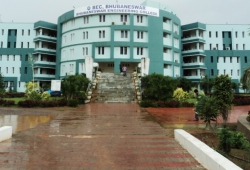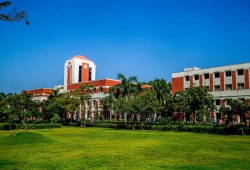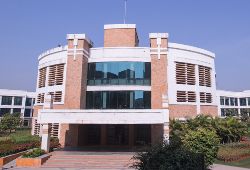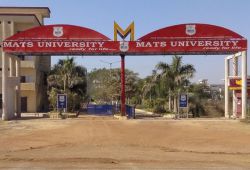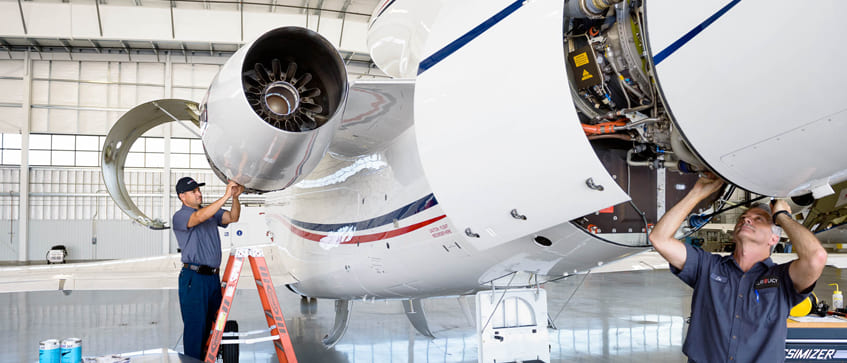
Best Aeronautical Engineering Colleges in Chennai
Chennai is home to prestigious colleges of aeronautical engineering and is renowned for its rich industrial past. These educational establishments are well known for their emphasis on hands-on training and dedication to academic excellence. Chennai's aeronautical engineering colleges serve as a springboard for those who aspire to work in the aviation and aerospace sector.
Aeronautical Engineering Course Fees in Chennai:
Let's explore the Aeronautical Engineering Course Fees in Chennai based on degree levels:
Diploma in Aeronautical Engineering
- A more affordable choice, diploma programs are a great place for people just starting out in the field. Depending on the institution, the duration usually lasts between one and two years, and the fees range from INR 40,000 to INR 1,00,000.
Bachelor's Degree in Aeronautical Engineering
- A bachelor's degree is a common option for those seeking a thorough education in aeronautical engineering. Typically, the program lasts four years. For prestigious institutions in Chennai, fees can range from INR 1,00,000 to INR 4,00,000 or more.
Master's Degree in Aeronautical Engineering
- Individuals who want to specialize and progress in their careers enroll in master's programs. Depending on the reputation of the institution, these programs can cost anywhere from INR 1,50,000 to INR 6,00,000 and usually last for two years.
Scholarships and Financial Aid
- Financial aid and scholarships, as previously stated, can greatly lessen the financial burden. For deserving students, a number of public and private institutions in Chennai provide grants and scholarships. To lower the cost of your education, it is a good idea to look into and apply for these opportunities.
Exploring Eligibility for Aeronautical Engineering Colleges in Chennai
Typically, eligibility requirements for admission to Chennai's aeronautical engineering colleges include:
- Academic Qualifications: Having a solid background in mathematics, physics, and chemistry and passing the 10+2 exam.
- Entrance Examinations: Passing state-level engineering entrance exams or entrance exams such as JEE Main, JEE Advanced, or AME CET.
- Minimum Aggregate Marks: Minimum aggregate marks (usually 50% or higher) in the qualifying examination.
- Additional Entrance Exams: Candidates may need to pass extra entrance exams administered by the individual colleges in order to be admitted to some of them.
- Age and Nationality: In order to be eligible, applicants may need to meet certain nationality or age restrictions set by particular colleges.
Exploring Aeronautical Engineering Campus Facilities in Chennai
For practical training and state-of-the-art research, aeronautical engineering significantly depends on specialized infrastructure and facilities. The modern facilities offered by aeronautical colleges in Chennai, a city renowned for its booming aerospace industry, will be examined in more detail in the section that follows.
- Cutting-Edge Laboratories: These labs give students a practical understanding of aviation technology by housing wind tunnels, material testing equipments, and flight simulation tools.
- Aircraft Maintenance Hangars: Hangars on campus where students can get hands-on experience fixing and maintaining aircrafts.
- Rich Library Resources: Libraries that are well-stocked with a vast array of books, research papers, and internet resources to help students learn more and do research.
- Aviation Workshops: Workshops with the instruments and equipment needed to construct and modify aircraft parts provide hands-on experience in aircraft engineering.
- Computer Labs: Computer labs with software for engineering projects and aerodynamic simulations allow students to use technology in their education.
- Interactive Classrooms: The educational experience is improved by the use of audio-visual aids in modern classrooms that promote interactive learning.
- Research Centers: Committed to state-of-the-art aerospace research, offering students chances to work on creative projects.
- Hostel Facilities: On-campus housing promotes a feeling of community and togetherness while ensuring students' safety and convenience.
- Sports and Recreation: Sports fields, gyms, and cultural clubs provide a well-rounded lifestyle that supports students' mental and physical health.
Admission Process for Aeronautical Engineering Colleges in Chennai
Following a certain admissions procedure is necessary to guarantee a spot in a prominent Chennai aeronautical engineering college. Let's examine the procedures and requirements for this journey in more detail.
The following procedures are involved in the admissions process for aeronautical engineering colleges in Chennai via the aircraft maintenance engineering Common Entrance Test (AME CET):
- Application: The first step for prospective students is to fill out the AME CET application form with all the required information.
- Entrance Exam: The AME CET exam, which evaluates candidates' knowledge and proficiency in aircraft maintenance engineering, must be taken.
- Counseling: Eligible candidates are invited to attend counseling sessions following the announcement of the exam results. Based on their AME CET rankings and the number of seats available, students can choose the colleges and courses they want to take during these sessions.
- Document Verification: Candidates must provide necessary documentation, such as their identification documents, AME CET scorecards, and educational certificates, as part of the counseling process.
- Seat Allotment: Candidates are given seats by colleges according to their selections and performance on the AME CET Exam.
- Fee Payment: To guarantee their spot at the selected college, admitted students must pay the necessary fees.
- Reporting to College: Lastly, in order to finish the admissions requirements and start their aeronautical engineering program, students who were accepted through the AME CET must report to their respective colleges on the specified date.
Aeronautical Engineering Entrance Exams in India
Aeronautical engineering entrance exams are standardized exams designed to understand prospective students' aptitude, knowledge, and abilities in preparation for a career in the field. These tests are essential to the admissions process for many Indian colleges and universities' aeronautical engineering programs. The following well-known entrance exams are accepted for admission to programs in aeronautical engineering:
- Joint Entrance Examination (JEE) Main: The national entrance exam known as JEE Main evaluates applicants' knowledge of mathematics, physics, and chemistry. JEE Main scores are taken into consideration for admission to many of India's most prominent engineering colleges, including those in Chennai.
- Joint Entrance Examination (JEE) Advanced: After passing JEE Main, candidates move on to JEE Advanced. Admission to esteemed Indian Institutes of Technology (IITs), some of which provide programs in aeronautical engineering, is determined by this.
- Aircraft Maintenance Engineering Common Entrance Test (AME CET): Made especially for admission to programs in aircraft maintenance engineering, which is closely related to aeronautical engineering. Colleges in Chennai and other parts of India that offer these programs accept it.
- State-Level Engineering Entrance Exams: Students can use the results of the engineering entrance exams administered by several Indian states to gain admission to aeronautical engineering programs in those states.
Discover Aeronautical Engineering Specializations
Due to its multidisciplinary nature and range of specializations, aeronautical engineering enables students to customize their education to fit particular interests within the aerospace sector. To meet the various needs of the aviation and aerospace industries, Chennai's aeronautical engineering colleges offer a variety of specialized programs. Here, we examine some of the main specializations that students can choose from:
- Aircraft Design and Manufacturing: Focuses on the development of aircraft, including topics such as materials, manufacturing procedures, structural design, and aerodynamics. Students become proficient in creating safe and effective aircraft designs.
- Aerospace Propulsion: Focuses on propulsion systems, rockets, and aircraft engines. Students gain knowledge of engine design, flight mechanics, and propulsion principles.
- Avionics and Control Systems: Focuses on the electronic systems found in aircrafts, such as flight control, navigation, and communication. This area of expertise explores the technology that maintains the efficiency and safety of aircrafts.
- Aircraft Maintenance and Repair: Focuses on aircraft maintenance, inspection, and repair. Students become experts in ensuring the airworthiness and safety of aircraft, making them indispensable in the aviation industry.
- Space Technology and Exploration: Explores satellite technology, space mission planning, and spacecraft design. Projects involving satellites, space missions, and interplanetary exploration may be undertaken by students.
- Aeronautical Research and Development: Emphasizes cutting-edge research in aeronautics. Students engage in projects that push the boundaries of aerospace technology and innovation.
- Unmanned Aerial Vehicles (UAVs) and Drones: Focuses on the design, operation, and application of unmanned aerial vehicles for tasks like surveillance, delivery, and data collection.
- Aerospace Management: Geared towards students interested in the business side of the aviation industry, covering topics like aviation operations, airline management, and aviation marketing.
Pursuing Higher Qualifications in Aeronautical Engineering
Professionals wishing to progress their careers, focus on particular areas, or conduct cutting-edge research may find that obtaining additional qualifications can lead to a variety of opportunities in the dynamic and constantly changing field of aeronautical engineering. Aeronautical engineers may want to take into consideration the following additional qualifications:
- Master's in Aeronautical Engineering (M. Tech/MS): Professionals can specialize in areas such as structural design, propulsion systems, or aerodynamics with a postgraduate degree in aeronautical engineering.
- Doctor of Philosophy (Ph.D.) in Aeronautical Engineering: A Ph.D. in aeronautical engineering provides the opportunity to significantly advance the field for individuals who are passionate about research and innovation.
- Master of Business Administration (MBA): In the aerospace sector, combining an MBA with a technical background can lead to management and leadership positions.
- Certifications and Licenses: A licensed aircraft maintenance engineer (AME) or certification in a particular software or technology utilized in the aerospace industry are just two of the many licenses and certifications that aeronautical engineers can pursue.
- Short-Term Courses and Workshops: Attending short-term classes, workshops, and seminars provided by academic institutions and industry associations can help one stay current with the most recent developments in the field.
- Specialized Master's Programs: Specialized master's degrees in fields like space technology, aviation safety, or aerospace management are available from certain universities.
- Online Courses and Massive Open Online Courses (MOOCs): A wide amount of aerospace-related subjects are covered by the many online courses and MOOCs that are offered on platforms such as Coursera, edX, and Udemy.
Top Recruiters for Aeronautical Engineering Graduates
Gaining knowledge of the best recruiters in the industry can help you find possible job openings. The following well-known businesses actively seek out Chennai-based graduates in aeronautical engineering:
- Indian Space Research Organization (ISRO): ISRO offers exciting career opportunities in satellite development, rocket propulsion, and space exploration projects.
- Hindustan Aeronautics Limited (HAL): HAL, a major aerospace and defense company, recruits aeronautical engineers for roles in aircraft and helicopter manufacturing.
- Defense Research and Development Organization (DRDO): DRDO's aeronautical engineers work on defense technology projects, such as avionics and missile development.
- Bharat Heavy Electricals Limited (BHEL): To work on gas turbine equipment used in power generation, BHEL employs aeronautical engineers.
- National Aeronautics Laboratory (NAL): Aeronautical engineers help with aircraft design, wind tunnel testing, and aerodynamic research, and NAL is primarily focused on aerospace research.
- Air India: Aeronautical engineers are employed by the national carrier to maintain and engineer aircraft, guaranteeing flight safety.
- Private Aerospace Companies: Companies like Tata Advanced Systems, L&T, and Mahindra Aerospace provide diverse career opportunities in aerospace technology and manufacturing.
- Aviation Companies: airlines such as indigo, spicejet, and Vistara hire aeronautical engineers for aircraft maintenance and safety roles.
- Research and Development Centers: Aeronautical engineering graduates can engage in cutting-edge research in educational institutions, research centers, and independent organizations.
- Consulting and Engineering Firms: Consulting giants like Wipro, TCS, and Infosys have aerospace divisions that offer engineering solutions to the aviation and aerospace industry.
Aeronautical Engineering Course Syllabus
Understanding the syllabus is crucial for prospective students. Here's an overview of the typical curriculum and subjects covered in aeronautical engineering programs in India:
First Year Courses:
- Mathematics and Applied Mathematics
- Physics
- Engineering Mechanics
- Engineering Graphics
Second Year Courses:
- Aerodynamics
- Fluid Mechanics
- Materials Science and Engineering
- Thermodynamics
Third Year Courses:
- Aircraft Structures
- Aircraft Propulsion
- Aircraft Design and Manufacturing
- Avionics and Control Systems
Fourth Year Courses:
- Flight Mechanics and Aircraft Performance
- Aircraft Maintenance and Repair
- Aerospace Propulsion Systems
- Project Work and Internships
Aeronautical Engineering Course Duration
Typically, aeronautical engineering college programs span four years for a Bachelor's degree, divided into eight semesters. During this time, students cover a diverse range of subjects and gain the necessary knowledge and skills to excel in the aerospace industry.



